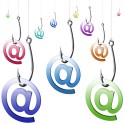 Beware of phishing emails circulating on campus with the subject of “Submit” and appears to be from Carleton University. Do not reply to the message, do not click on the link within the body of the message and do not provide your email and/or account information. This is a phishing attempt and this email should be deleted immediately.
Beware of phishing emails circulating on campus with the subject of “Submit” and appears to be from Carleton University. Do not reply to the message, do not click on the link within the body of the message and do not provide your email and/or account information. This is a phishing attempt and this email should be deleted immediately.
If you have already clicked on the link or have already responded to this email, please change your password immediately.
How can you tell if an email is a phishing attempt?
- It asks you for your password or directs you to a web form asking for your password
- If the link within the body of the message points to a non-Carleton email address
- The subject line is in all caps
- There is a call for immediate action – “download this now” or “confirm you email identity now” or “click on the link below”
- There are spelling or grammatical errors in the email
How you can reduce Spam?
- Do not open an email that looks like Spam.
- Just delete it. Simply opening the message can send a read receipt message back to the spammer confirming that your e-mail account is active.
Do not reply to a Spam message.
Spammers will regard this as a ‘hit’ and your e-mail account will be confirmed as active.
Do not make your e-mail address available on web pages.
Use an alternate e-mail address when using Usenet newsgroups. Spammers use harvesting software that surfs the Internet to glean e-mail addresses from web sites and newsgroups. An alternate e-mail address will protect your Carleton e-mail address and help reduce the amount of spam received at Carleton. Free e-mail services are readily available from many sources.
Guard your e-mail address carefully.
Do not give your e-mail address to web sites unless you are sure what they are going to do with it. Read any terms of use and privacy statements. Many greeting card and joke-of-the-day websites gather e-mail addresses for spam use. Never subscribe your friends to a web site as you may be giving their address to a spammer.